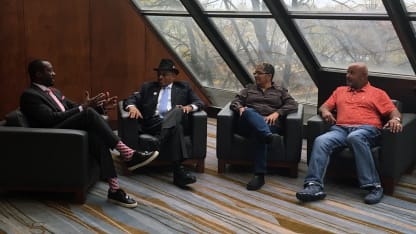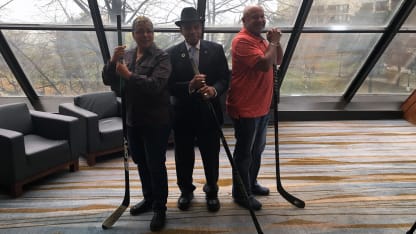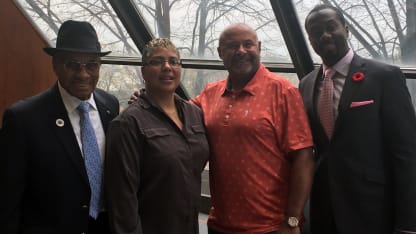"And they've got it on tape and hopefully they'll be able to show it," said O'Ree, who made his NHL debut for the Boston Bruins on Jan. 18, 1958. "It's a nice feeling just to know that I had a small part of opening doors and breaking down barriers to make it possible for not only Angela but for Grant and Anson to play in the NHL."
The roundtable was arranged by Kwame Mason, the writer, producer and director of "Soul on Ice: Past, Present and Future," a 2015 documentary that details the history of black players in ice hockey.
"You talk about Mr. O'Ree's background and where he came up, my background and Grant's background, it hits so many different things from being adopted, being bi-racial, and Anson being a star in the NHL and now sitting here commentating," James said. "It shows you can do anything if you put your mind to it."
Unlike the three Hall of Famers he was interviewing, Carter immediately thought of the historic element of the roundtable when he was asked by Mason to moderate it.
"Oh yeah, 100 percent," he said. "When I was asked to do this, I didn't even hesitate."
Carter, who had 421 points (202 goals, 219 assists) in 674 games during 10 seasons in the NHL, also has a different perspective as a player who benefitted from the barriers O'Ree, James and Fuhr broke before he got to the NHL in 1996.
"I wasn't a goaltender because goalie equipment is so expensive, but I loved everything about Grant Fuhr's game, the athleticism and the fact that he won, played on the best teams," Carter said. "For me to have a sit-down with him, it blew my mind. I told my brother and he was like, 'What?' And Angela James, she's the reason I watch women's hockey. I remember watching her back in 1990 and I was thinking, 'Who is this powerful skater with sick hands, just dominating this game the way Gretzky used to do in the '80s?'"





